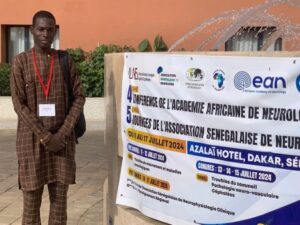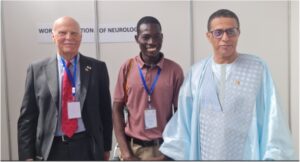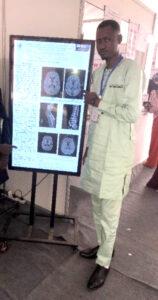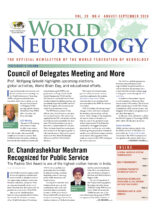Both of this issue’s Junior Traveling Fellowship recipients attended the Fourth Congress of the African Academy of Neurology (AFAN), held in conjunction with the Fifth Congress of the Association Senegalese of Neurology (ASN), July 11-17, in Dakar, Senegal. Each brings their own perspective on what they saw and did during the meeting.

Movement Disorders Society course on Day 1.
Mahamadou Kotioumbe
My participation in the joint congress was made possible by the WFN Junior Traveling Fellowships Grant awarded by the World Federation of Neurology (WFN).
The congress included the Movement Disorders Society (MDS) course, the main congress sessions, and the Teaching Courses.
MDS Course
The MDS course covered a range of topics in movement disorders, including:
- Parkinson’s disease: Advances in diagnosis, including genetic aspects, treatment, and management
- Management of atypical Parkinsonian syndromes
- Hyperkinetic movement disorders: Diagnosis, management, and treatment
- Treatable movement disorders
There were a number of take-home messages from the course, including the importance of early and accurate diagnosis in improving patient outcomes. We also learned about novel therapeutic strategies, including deep brain stimulation and pharmacological interventions. And there was much said about the role of genetics in movement disorders and the potential for personalized medicine.

(Left to right) Prof. Wolfgang Grisold, Mahamadou Kotioumbe, and Prof. Riadh Gouider.
Congress Sessions
The main congress sessions featured plenary lectures, oral presentations, and poster sessions on various neurological conditions. The key topics included sleep disorders, stroke, and headaches. Epilepsy, neuroinfectious diseases, and neuro-environment diseases were also covered. I also had the opportunity to present an oral communication, titled “Unusual Presentation of Intracerebral Hemorrhage: A Report From Mali.”
Teaching Courses
The Teaching Courses focused on practical skills and knowledge essential for neurologists in the region.
Sessions included:
- Neuropathies, clinical neurological examination, and EMG
- Practical approaches in resource-constrained environments to autoimmune encephalopathies, HIV-related CNS infections, status epilepticus, and stroke.
- Guidance on writing a scientific article, research project, leadership, and networking
Students came away from the courses with improved proficiency in conducting comprehensive clinical neurological examinations and using EMG for diagnosing neuropathies. We also gained practical approaches for managing critical neurological conditions in resource-constrained environments, such as utoimmune encephalopathies, HIV-related CNS infections, status epilepticus, and stroke. Finally, we received guidance on writing scientific articles and research projects, which is crucial for contributing to the body of neurological research.
Networking and Collaborations
The congress provided an excellent platform for networking with neurologists from around the world. I had the opportunity to meet and interact with leading experts, including:
Prof. Amadou Gallo Diop, Prof. Osheik Seidi, Prof. Riadh Gouider, Prof. Wolfgang Grisold, and many others.
Acknowledgments
Attending the joint congress of the AFAN and the ASN was an invaluable experience. It significantly enhanced my knowledge and skills, provided opportunities for networking and collaboration, and inspired new ideas for future research and clinical practice.
I would like to extend my sincere gratitude to the World Federation of Neurology for the travel grant, which made this enriching experience possible, to the organizers of the congress, and to all of the professors and colleagues I had the pleasure of meeting and learning from during this conference.

Carlos Othon Guelngar
Carlos Othon Guelngar
It was a great privilege for me to participate in the Fourth Congress of the African Academy of Neurology (AFAN), held in conjunction with the Fifth Congress of the Association Senegalese of Neurology (ASN).
The meeting featured an exciting mix of eminent speakers from English- and French-speaking Africa, as well as from Europe and the U.S.
During the meetings, I had the opportunity to present my work on gait disorders revealing a probable sporadic form of Creutzfeldt-Jakob disease, which was diagnosed in the neurology department of the Center Hospitalier de Montluçon.
I also discussed the burden of neurological diseases in Africa. Sleep disorders, strokes, and headaches are real public health problems. The first days of the congress were rich in themes focusing on abnormal movements in neurological conditions. This was organized by the International Parkinson and Movement Disorder Society – African Section (MDS-AS). At the end of the post-congress session, we also enjoyed presentations on neurophysiology, followed by a visit to the MDS neurophysiology training center.
I would like to thank the World Federation of Neurology (WFN) for the Junior Traveling Fellowship that granted me this opportunity, which enabled me to travel, present my work, and forge relationships with our neurophysiological colleagues.
Thanks also to the organizers of the ASN and AFAN. •
Mahamadou Kotioumbe is a neurology resident from Mali. Carlos Othon Guelngar is a young neurologist from Chad.
